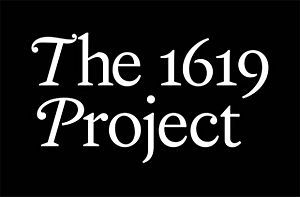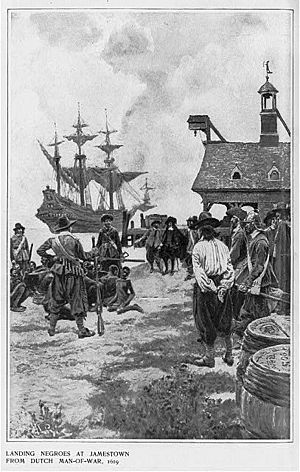The 1619 Project facts for kids
Quick facts for kids "The 1619 Project" |
|
|---|---|

The 1619 Project logo
|
|
| Country | United States |
| Language | English |
| Genre(s) | Long-form journalism |
| Publisher | The New York Times |
| Publication date | August 2019 |
The 1619 Project is a special collection of articles and other materials. It was created by Nikole Hannah-Jones and writers from The New York Times. The project's main goal is to help people see U.S. history in a new way. It focuses on how slavery and the important contributions of Black Americans have shaped the country.
The project first appeared in The New York Times Magazine in August 2019. This was to mark 400 years since the first enslaved Africans arrived in the English colony of Virginia. Over time, the project grew to include newspaper articles, live events, and a podcast.
The 1619 Project has led to many discussions and debates among historians and thinkers. In May 2020, Nikole Hannah-Jones won the Pulitzer Prize for Commentary for her introduction to the project.
Contents
Why the 1619 Project Started
The 1619 Project began in August 2019. It marked 400 years since the first enslaved Africans came to colonial Virginia. In 1619, a ship called The White Lion arrived at Old Point Comfort in Virginia. It carried about 20 to 30 Africans who had been captured. These people were taken during a fight in modern-day Angola.
Some people have discussed whether these specific arrivals in 1619 were immediately enslaved. They also point out that enslaved Africans arrived in other parts of North America even earlier, in 1526. European slavery in the Americas began as early as 1493.
About the Project
The 1619 Project dedicated a whole magazine issue to looking at the history of slavery in the United States. It challenged the idea that U.S. history only began in 1776 with the country's independence. The project quickly became much bigger.
It included many magazine issues and other materials from the Times. It also created a special learning plan for schools. This plan was made with the Pulitzer Center. The project worked with historians and the Smithsonian for facts and research. Most of the writers for the project were African-American. This was important to share their unique view of history.
First Magazine Issue: August 2019
The first edition of the project came out in The New York Times Magazine on August 14, 2019. It was 100 pages long. It had ten essays, a photo story, and a collection of poems and fiction. Jake Silverstein wrote the introduction.
Here are some of the works included:
- "America Wasn't a Democracy Until Black Americans Made It One", essay by Nikole Hannah-Jones
- "American Capitalism Is Brutal. You Can Trace That to the Plantation", essay by Matthew Desmond
- "How False Beliefs in Physical Racial Difference Still Live in Medicine Today", essay by Linda Villarosa
- "What the Reactionary Politics of 2019 Owe to the Politics of Slavery", essay by Jamelle Bouie
- "Why Is Everyone Always Stealing Black Music?", essay by Wesley Morris
- "How Segregation Caused Your Traffic Jam", essay by Kevin Kruse
- "Why Doesn't America Have Universal Healthcare? One Word: Race", essay by Jeneen Interlandi
- "Why American Prisons Owe Their Cruelty to Slavery", essay by Bryan Stevenson
- "The Barbaric History of Sugar in America", essay by Khalil Gibran Muhammad
- "How America's Vast Racial Wealth Gap Grew: By Plunder", essay by Trymaine Lee
- "Their Ancestors Were Enslaved by Law. Now They're Lawyers", photo essay by Djeneba Aduayom, with text from Nikole Hannah-Jones and Wadzanai Mhute
- "A New Literary Timeline of African-American History", a collection of original poems and stories:
- Clint Smith on the Middle Passage (the sea journey of enslaved Africans)
- Yusef Komunyakaa on Crispus Attucks
- Eve L. Ewing on Phillis Wheatley
- Reginald Dwayne Betts on the Fugitive Slave Act of 1793
- Barry Jenkins on Gabriel's Rebellion
- Jesmyn Ward on the Act Prohibiting Importation of Slaves
- Tyehimba Jess on Black Seminoles
- Darryl Pinckney on the Emancipation Proclamation of 1863
- ZZ Packer on the New Orleans massacre of 1866
- Jacqueline Woodson on Sgt. Isaac Woodard
- Joshua Bennett on the Black Panther Party
- Lynn Nottage on the birth of hip-hop
- Kiese Laymon on the Rev. Jessie Jackson’s “rainbow coalition” speech
- Clint Smith on the Superdome after Hurricane Katrina
One main idea from Nikole Hannah-Jones was that some colonists fought the Revolutionary War to keep slavery. The essays also connect slavery and segregation to modern American life. For example, they discuss how these histories relate to traffic jams and why Americans like sugar.
Matthew Desmond's essay suggests that slavery helped shape modern capitalism and work rules. Jamelle Bouie's essay compares pro-slavery politics to some modern political ideas. He argues that the U.S. still struggles with the idea that some people deserve more power.
Other Materials and Activities
The magazine issue also came with a special section in the Sunday newspaper. This section was made with the Smithsonian. It looked at the start of the transatlantic slave trade.
A podcast series called "1619" also began. It was published by The Daily, a news podcast from the Times. The Sunday sports section had an essay about how slavery affected professional sports.
The Times plans to share the project with schools. The 1619 Project Curriculum was made with the Pulitzer Center. Many extra copies of the magazine were printed for schools, museums, and libraries.
The Pulitzer Center on Crisis Reporting offers free online lesson plans. They also collect new lesson plans from teachers. The Center helps arrange for speakers to visit classrooms. Most of the lessons can be used by students from elementary school to college.
See also
 In Spanish: The 1619 Project para niños
In Spanish: The 1619 Project para niños
 | Chris Smalls |
 | Fred Hampton |
 | Ralph Abernathy |


